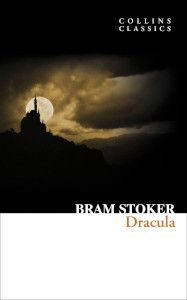Dracula
25 November 2022 1 Comment
Author: Bram Stoker
Summary: We are in Transylvania; and Transylvania is not England. Our ways are not your ways, and there shall be to you many strange things.
Earnest and naive solicitor Jonathan Harker travels to Transylvania to organise the estate of the infamous Count Dracula at his crumbling castle. Finding himself imprisoned, Harker experiences all manner of supernatural horrors until he eventually escapes to be reunited with his fiancee Mina. Meanwhile in England, Mina’s friend Lucy has been bitten and Mina herself is under threat from the Count as he attempts to quell his appetite for human blood.
Arguably the most enduring Gothic novel of the 19th Century, Bram Stoker’s Dracula is as chilling today in its depiction of the vampire world and its exploration of Victorian values as it was at its time of publication.
Rating: ★★★☆☆ 3/5
Review: I started reading Dracula way back at the beginning of May with thousands of other people via Dracula Daily. An email subscription that sends you the journals and letters the book consists of in chronological order on the day they’re written. It was a really fun and well-paced way of reading what can seem like quite an intimidating novel. The shit posts, memes, and general community fun that it inspired on tumblr in particular was a wonderful companion to the reading.
There are several storylines in the book that gradually converge, which is something I very much enjoy in fiction. Seeing these characters that I’ve grown fond of meeting and worlds colliding. I mean, the circumstances of a blood-sucking creature of the night attempting to recruit isn’t the most wonderful way to begin a friendship, but they make it work!
My good friend Jonathan Harker is our first main character, and it was easy to like him. He’s noting all these strange and unique things about his host, Count Dracula, but brushing them off while I’m there mentally screaming at him about the very obvious elephant vampire in the room. My two very favourite characters are Mina, Jonathan’s wife, and Van Helsing. They are honestly the only two with any sense and respect each other a lot. And okay, I have a soft spot for Quincey whose head is “in plane with the horizon” but the four young men are mostly just muscle and money.
Despite that, though, there is a fair amount of misogyny. “Poor Madam Mina, we must protect her” etc, etc. As if they would have got anywhere without her, honestly. It’s certainly a product of its time, though, and Mina is a badass, so I’m willing to not hold it against the book… too much.
What I will hold against it, though, is how flipping verbose it is. Long paragraphs of overly wordy dialogue (mostly from Van Helsing; he loves the sound of his own voice, and I love intelligent fictional characters with an ego), which was so unnecessarily dense that it has to be summed up by another character afterwards.
The thing I enjoyed most about the book were the details that we now take for granted in stories about vampires, and seeing where all these tropes and cliches first came from. Sleeping in coffins, transforming into a bat, having to be invited in, an aversion to garlic. And seeing the details that have changed over the years into other things. Daylight being fatal for vampires, when in fact Dracula walks around fine during the day but is simply at his most powerful during the night; holy water when in the book they use holy wafers (which is objectively hilarious).
I actually fell behind with the Dracula Daily emails at the start of October, when my life got busy and the entries got long. I ended up reading my physical copy of the book to finish it, as seeing how much was left help me motivate and pace myself.
My biggest critisism, towards the end of the book as Mina was travelling through Romania towards Dracula’s castle in Transylvania, was Stoker’s missed opportunity for a callback to Jonathan’s original journey at the start of the book. Imagine it. Mina partaking in local cuisine and thinking to herself: “So this is the paprika Jonathan wrote of in his letters… it’s not that spicy.”
























